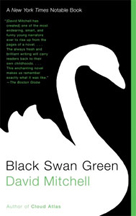
The International Stuttering Association (ISA) congress, organized by the Dutch stuttering association Demosthenes, will take place in Lunteren, the Netherlands, from the 10th to the 13th June 2013. The aim of this congress is to create a platform for people from all over the world who stutter or are involved, professionally or personally, with stuttering.
The congress has an impressive lineup of keynote speakers, including British author David Mitchell. He is probably best known for his novel Cloud Atlas, which was made into a movie last year. He has written two books since, Black Swan Green, and the Thousand Autumns of Jacob de Zoet.

Black Swan Green is David Mitchell's semi-autobiographical story of an adolescent boy growing up in 1980s Britain. Young Jason Taylor struggles not only with the regular trials and tribulations of the early teen years but a bad stammer as well. There aren't a lot of novels with a stuttering protagonist, and fortunately the ones that do (like David Shield's Dead Languages) communicate the pathos of the affliction while also being light-hearted and sometimes hilarious.
The Taylors are a middle class family living in the small English village of Black Swan Green. Jason’s older sister takes off for college, and he’s left alone in the midst of his ever-feuding parents and their turbulent marriage. Stuttering being a rather severe social liability, he inevitably finds himself on a low rung of the social totem pole at school, and the butt of jokes and teasing.
In his mind, Jason’s stutter is referred to as "Hangman", a sinister inner force that acts as gatekeeper to his voice, letting some words through and others not, "his snaky fingers that sneak inside my tongue and squeeze my windpipe so nothing'll work".
Black Swan Green is full of a young boy’s formulative experiences, including his participation in neighbourhood pranks with other boys, enduring the torments of bullies, meeting up with a band of gypsies in a forest and, in one of the book’s most delightful sections, being mentored by an eccentric old German lady in the art of writing poetry.
His stammering does not, of course, define his identity, but it informs it, in both adverse and positive ways. Always afraid of being tripped up by “Hangman”, he internalizes a multitude of thoughts that go unsaid, observations about the world and himself. A proud fighting spirit and an ability to see past the surface of things saves him, in the end, from falling into the trap of self-pity. Stuttering can, after all, result in a strong internal fortitude, as well as greater empathy for others who are disregarded or misunderstood. We see this partly through his rapport with a local gypsy community, unwanted and discriminated against by most of the village.
Part of Jason’s maturity throughout the book is learning how not only to stand up for himself, but also to see the humanity of other people, even the villains of life, and understanding that everybody has their own challenges. In the end, stuttering isn’t even the biggest test in his life – rather, it’s finding the courage to be a good person.
Black Swan Green is available at Chapters.
Below is an interesting interview with David Mitchell, who talks about his writing career.